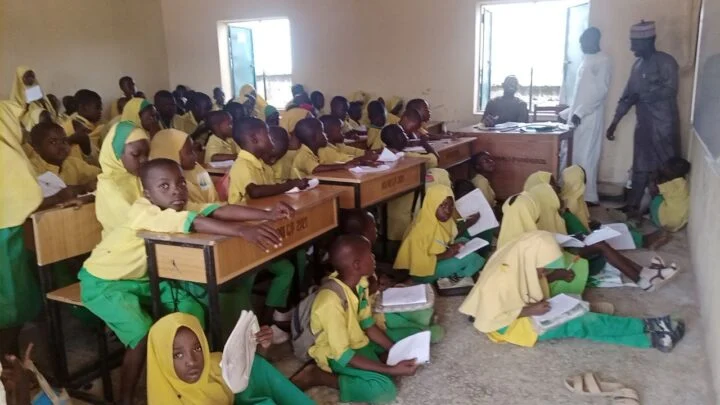How challenges with birth registration could affect Nigerian children’s future

Nigeria’s public education in shambles. Photo credit: James Ojo/TheCable Newspaper
In Nigeria, the right to a legal identity is a fundamental aspect of childhood that remains unfulfilled for millions of children. Despite the critical importance of birth registration, many Nigerian children lack this essential document, which serves as a gateway to education, healthcare, and social services.
Recently, the United Nations Children’s Fund (UNICEF), in collaboration with the Renewed Hope Initiative (RHI) and the National Population Commission, launched a groundbreaking campaign aimed at promoting universal free birth registration. According to UNICEF, over 50% of births of children under five in Nigeria remain unregistered.
This initiative not only seeks to address the systemic challenges surrounding birth certificate issuance but also emphasises the urgent need to safeguard children’s rights by ensuring that every child is legally recognised.
The Challenges in Nigeria’s Birth Registration
Despite UNICEF’s continued call for inclusive and accessible registration processes, many families, especially in rural areas, face significant barriers in registering their children. Some of these barriers include:
Administrative Inefficiencies and Corruption: Reports indicate that officials from the National Population Commission often demand unofficial cash payments as “administrative charges” for birth registration, leading to allegations of extortion and corruption. Many applicants have reported being charged additional fees without receiving receipts, which adds to the burden of obtaining necessary documents for their children.
Financial and Geographic Barriers: The costs associated with obtaining a birth certificate, combined with the limited number of registration centres, disproportionately affect low-income families. Many parents struggle to afford the official fees plus any additional charges, while others face long distances to access registration facilities, particularly in rural areas.
Low Public Awareness: There is a significant lack of awareness regarding the importance of birth registration among the public. Studies have shown that many parents do not understand the implications of not registering their children’s births, which contributes to the high rates of unregistered births in Nigeria.
Impacts of Lack of Birth Certificates on Children’s Future
Children without birth certificates face numerous challenges that can hinder their future progress. The following are some impacts:
Limited Access to Education and Healthcare: Children without birth certificates often encounter barriers to enrolling in schools and accessing healthcare services. This lack of documentation prevents them from verifying their age, which is essential for school admission and eligibility for health programmes, ultimately hindering their development and well-being.
Barriers to Legal Identity and Citizenship: According to the Global Financial Facility, without a birth certificate, children are denied legal identity and citizenship rights, which can limit their opportunities for employment and participation in society. This exclusion can perpetuate cycles of poverty and marginalisation; unregistered children may not be able to access social services or legal protections.
Increased Vulnerability to Exploitation and Social Exclusion: Unregistered children are at a higher risk of exploitation, including child labour, trafficking, and forced recruitment into armed groups. Their lack of legal status makes it difficult for them to seek help or protection from abuse, leading to increased social exclusion and vulnerability.
Recommendations and Solutions
To resolve these issues, certain measures must be considered:
Implement UNICEF’s Guidelines: Adopting UNICEF’s guidelines for birth registration can enhance the legal identity of children. This includes establishing efficient systems for immediate registration at birth and integrating registration with health services to ensure accessibility for all families, particularly in rural areas.
Government and Community Awareness Campaigns: Launching comprehensive awareness campaigns is essential to educate parents about the importance of birth registration. Engaging community leaders and utilising local media can help inform families about registration processes and the benefits of having a birth certificate, thereby increasing registration rates.
Use of Mobile and Digital Technology for Easier Registration: Leveraging mobile and digital technology, such as e-birth registration systems, can simplify the registration process. These systems can reduce geographic barriers by allowing parents to register births remotely, thus improving accessibility and efficiency in issuing birth certificates.
Addressing the challenges of birth certificate issuance in Nigeria is crucial for securing a brighter future for its children. UNICEF’s child protection specialist, Fatimah Adamu, emphasised during a two-day media dialogue in Kano State in 2023 that birth registration is core to every child’s identity document; identification at birth is every child’s first right.
This means that birth registration is not just an administrative task; it is a fundamental right that provides children with legal identity, enabling access to essential services such as healthcare and education. As emphasised by UNICEF, a robust civil registration system is vital for national development and governance, ensuring that every child is recognised and protected under the law. By overcoming these challenges, Nigeria can safeguard children’s rights and empower them to realise their full potential, ultimately contributing to a more equitable society.

